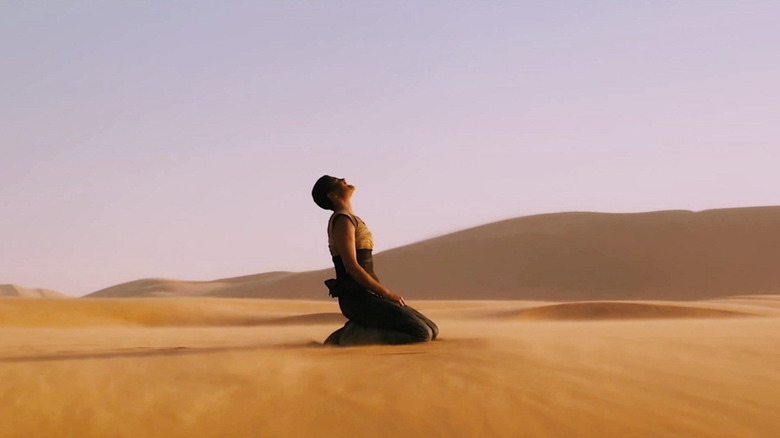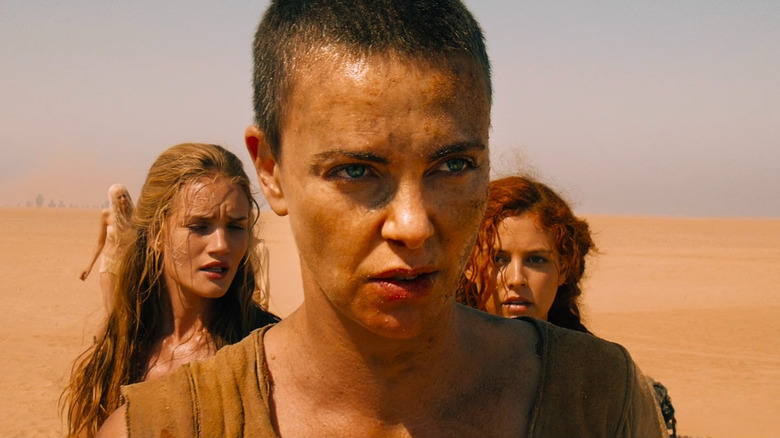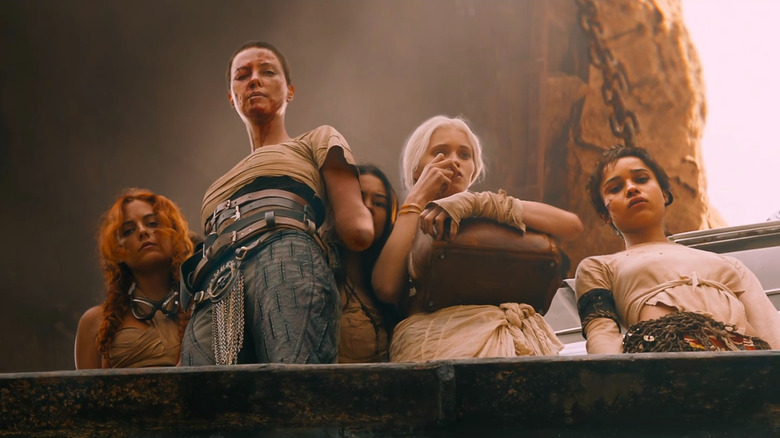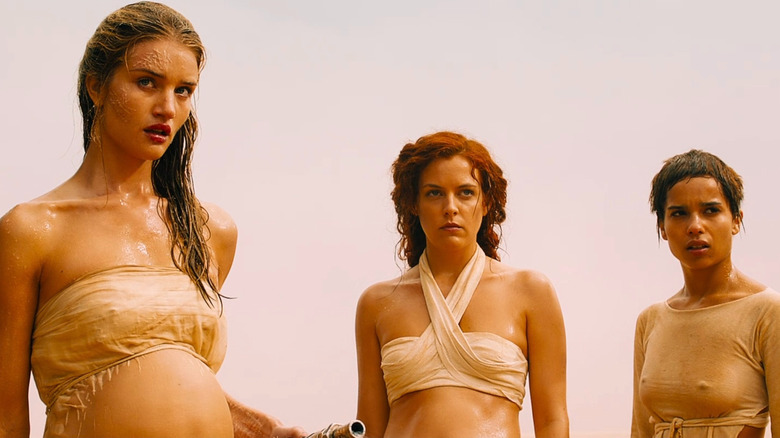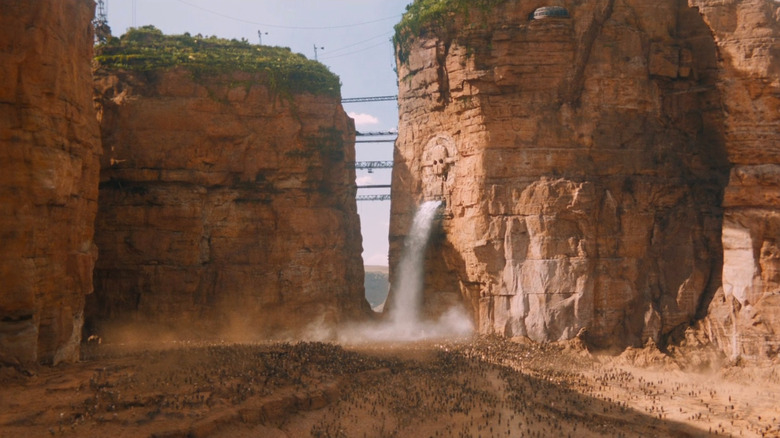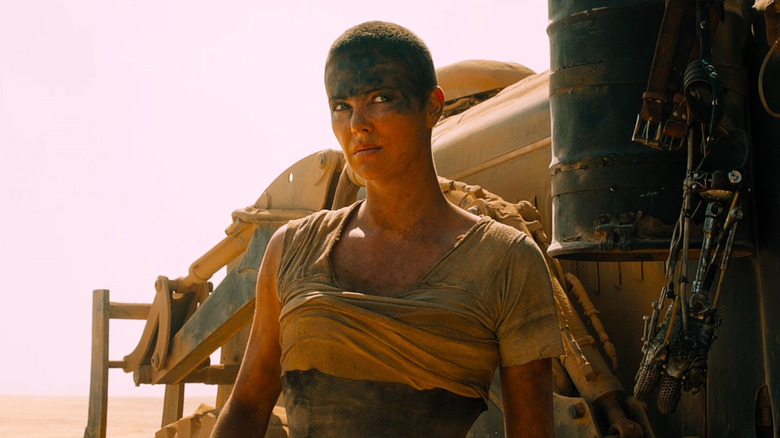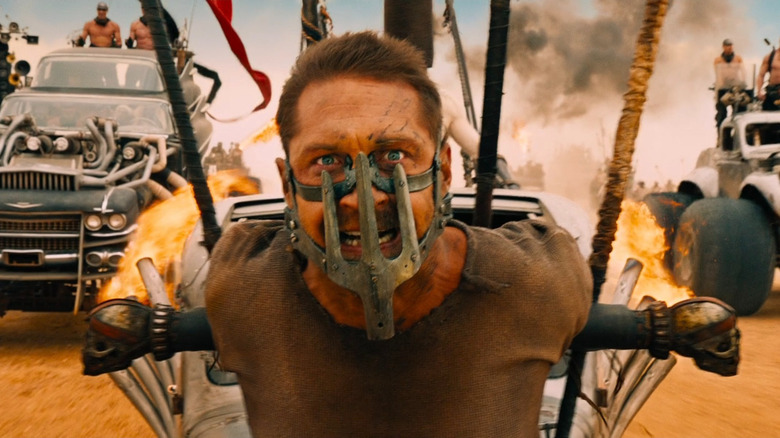Mad Max: Fury Road Ending Explained: Reclaiming One's Own Humanity
I feel that one of the bigger misconceptions about action cinema is that it is all about the spectacle. The chases, the fights, the explosions, the stunts. They exist to be an adrenaline rush, and if you feel like turning your brain off at the door of the auditorium, feel free to do so. Sure, you could do that, and plenty of people have enjoyed action movies that way for decades upon decades. However, the cream that rises to the top doesn't adhere to this mentality. Story and character are as important in action pictures as they are in heartbreaking dramas.
Even the most rip-roaring spectaculars know this to be true, and few exhibit that better than George Miller's 2015 masterpiece "Mad Max: Fury Road." When we think of the movie, the first images we think about are most certainly the moments of true visual awe, be it Tom Hardy's titular Max chained to the front of a car speeding through the desert or the war march led by a masked person playing a guitar that is also a flamethrower. The film features countless moments that have you wondering, "How did they do that?" or, "How did they survive that?"
But if "Mad Max: Fury Road" was just two hours of whizz-bang, it would not have latched itself into the hearts and minds of so many. It certainly wouldn't have been nominated for Best Picture and Director at the Oscars, that's for sure. The story for "Mad Max: Fury Road" may not be a labyrinthian puzzle box, but that doesn't make it any less engaging or, ultimately, powerful by the time we cut to the closing credits. Its power lies in its simplicity.
What you need to remember about the plot of Mad Max: Fury Road
"Mad Max: Fury Road" may only name one protagonist in its title, but the film features two. On one side, you have Max Rockatansky, with Tom Hardy picking up the mantle from Mel Gibson after the first three films. Max is a lone wolf in a desolate post-apocalyptic landscape. He is chased down and captured by the War Boys. They are a cult who see the tyrannical Immortan Joe (Hugh Keays-Byrne), leader of the authoritarian state called the Citadel, as their prophet. Not only has he amassed a religious following, but he also holds the citizens of the Citadel under his thumb, most notably by cruelly withholding water from them. The War Boys have captured Max because he is a universal blood donor, and they require near-constant transfusions, referring to their captives as "blood bags."
The other protagonist is Charlize Theron's Imperator Furiosa, a lieutenant in Immortan Joe's army. She's been instructed to drive a truck in the "War Rig" to go trade for gas and bullets, two precious commodities. However, that is not her plan. Unbeknownst to Immortan Joe, she has hidden away five of the tyrant's young wives, one of whom is pregnant, to bring them to a place free from his abuse and control, which she has also faced. Hardy's Max meets up with Furiosa after Immortan Joe has sent war parties after the rogue lieutenant, and he reluctantly agrees to join up with her and the wives, as he too is looking for freedom. On their trek across the desert, the War Boy who was using Max as a blood bag, Nux (Nicholas Hoult), joins the group, and tragically, Joe's "favorite" wife, The Splendid Angharad (Rosie Huntington-Whiteley), is killed along with her unborn child.
What happened at the end of Mad Max: Fury Road?
Furiosa's plan is to bring the wives to the "Green Place," where she grew up as a child before she was kidnapped by Immortan Joe. This is a place inhabited by a group — solely made up of women — called the Vuvalini. The ravages of this landscape have taken away the hope a livable society in the Green Place for much longer. It may have been prosperous and enchanting when Furiosa was a girl, but now, only a few members of the Vuvalini remain, most of whom are in the latter half of their lives.
Everyone then decides their best course of action is to return to the Citadel, as the city has been abandoned by any sort of defenses because Immortan Joe has sent every troop he could after them. The group suffers several casualties on their race back to the Citadel, including Nux making the ultimate sacrifice to blockade their chasers out of the city, but after capturing one of his wives back (Zoë Kravitz), Furiosa rescues her and kills Immortan Joe. Max, Furiosa, the four wives, and the last remaining members of the Vuvalini make it back to the now leaderless Citadel, where they are celebrated as liberators by the citizens. As all the women rise on a platform to take their place in the palace, Max leaves them behind to continue on with his wandering ways.
What the end of Mad Max: Fury Road means
Science-fiction films often ask the question, "What does it mean to be human?" They do this through aliens, robots, clones, and so many other metaphors. Even though "Mad Max: Fury Road" is a thrilling action movie, it's also a science-fiction film that asks this very same question, but does it without any of the usual stand-ins. It just does it with people. Oftentimes, the answer to the humanity question comes down to self-consciousness, emotions, desire, or pure biology. In the case of George Miller's film, it comes down to autonomy.
Every character we root for in "Mad Max: Fury Road" has had their autonomy taken away from them. Most explicitly, we have Immortan Joe's wives, each of whom has been forced into this union with a monster purely to be broodmares. In the United States, where abortion and a woman's right to choose have been systematically gutted (which has only gotten worse in the eight years since the film's release), this is where the idea of autonomy hits the hardest.
Furiosa, Max, and Nux are all victims of having their personhood stripped away too. Furiosa was kidnapped as a child and raised to be a soldier in her abductor's army. Here, she takes back her dignity and ability to make her own choices. Max was captured to literally be a blood delivery service for another person, a sack of flesh to pillage for resources. Nux was brainwashed to believe that dying for a tyrant was the greatest honor a person could have. Instead, his death comes on his terms to serve the people who also had their humanity taken away from them. People are unable to be people if they aren't in control of their bodies, their minds, and their choices.
What happens after the ending of Mad Max: Fury Road?
I am not crazy about speculating about what happens after the credits start to roll on a movie. What matters to me is what happens between the opening and closing frames. If something else was important, the filmmakers would have shown us that to begin with. "Mad Max: Fury Road" may be a franchise movie, but it is one of the more episodic franchises that exists with very little sense of continuity between the films. There's a guy named Max, and it's the post-apocalypse. That's about it. Even the trauma of who in his past has died changes from film to film. But I'll entertain the notion.
At the end of "Fury Road," Max goes off and has another adventure. That's what he does. Pretty simple. As for what happens at the Citadel, that's a little more complicated. Emotionally the film leaves us on a high, our heroes have defeated the villains and are able to run society as it should be run. After all, that triumph is why George Miller chose to end the film there. But what happens the next day? Is Furiosa a good leader of a society? What does the new government look like? What is the resource situation in the post-apocalypse?
Digging into these questions immediately takes you out of that emotional high you were on and makes you concerned about these people again. I like to think all of the problems were solved, but that isn't how the world works. At the least, I expect Furiosa to better disperse water to the citizens and begin to disassemble the tyrannical patriarchy that the Citadel was founded on. After that, there's the frustrations of everyday life, which aren't as high-octane as the car chases.
What has George Miller said about the ending?
George Miller is similarly ambivalent when it comes to what happens after the closing credits of "Mad Max: Fury Road." Speaking with Popverse in 2020, he posited what he thinks might happen when Furiosa takes control of the Citadel at the film's ending, and it isn't all great:
"I believe that whatever motivated Furiosa to do this thing came from a really brave a courageous space, and I think that's presented in the movie. Part of me would love if she pushed the world to a more equitable world. I'm not saying to a utopia because the world has already been destroyed. The Green Place was more utopian. The place she aspired to was more utopian. But back in the Citadel, she could also turn the other way ... I think she's too smart to fall into that trap. She's already seen it with the Immortan Joe. I believe he went through the same process. He was probably a heroic character in his own time."
Miller can't fully buy in to a rose-colored ending, and he's the one who created this world and characters. For him, the doubt all comes from the famed storytelling deconstructionist Joseph Campbell. Miller explained:
"Campbell said that the usual story is that today's hero becomes tomorrow's tyrant. The hero is the agent of change, and basically, they relinquish self-interest in order — for some common good ... So what happens is you love what you built or saved too much, and you become holdfast. You become the orthodoxy. You develop the dogma, and then basically, you have to protect it."
I know none of us want to believe that Furiosa and her cadre of women would go this way, but they certainly could. Even Miller thinks it's possible.
What the end of Mad Max: Fury Road could mean for the franchise
We will be returning to this world and the character of Furiosa in the future, but unfortunately these "Mad Max: Fury Road" ending questions will linger. The forthcoming "Furiosa," which is currently slated to come out May 24, 2024, is a prequel, and taking over the role from Charlize Theron will be Anya Taylor-Joy. There is still the possibility of more "Mad Max" sequels in the future as well, such as "Mad Max: The Wasteland," but development on that movie is completely up in the air currently. However, I don't think that would tell us very much about Furiosa and the Citadel, if the film is in keeping with the "Mad Max" tradition of being a standalone adventure.
Ultimately, the "what" of what happens after "Mad Max: Fury Road" doesn't matter. What does matter is the emotional truth that the film unpacks. The triumph of reclaiming one's own humanity is what George Miller wants you to connect to, and all the world-building and spectacular set pieces are in service of that core idea. Oppression — whether it is societal, personal, or psychological — must be overthrown in order for people to live the way they are meant to. That is what makes for a satisfying picture. Imagine if after the final moments of this film there was a scene set six months later where Furiosa was discussing government subsidies and trade routes. "Mad Max: Fury Road" has a perfect ending, and we don't need to know anymore.
